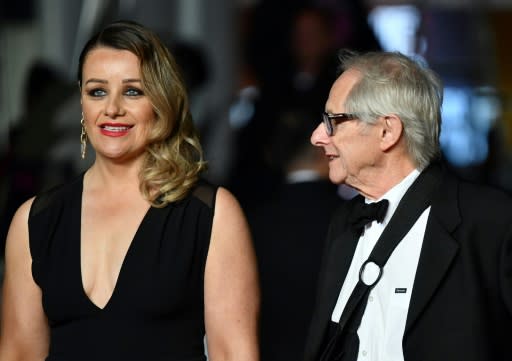Tech firm greed driving far-right anger, warns director Loach
Veteran British director Ken Loach was tipped Friday for a third Cannes win for a powerful film which put Amazon and other tech giants in the dock over their alleged exploitation of workers. Critics hailed "Sorry We Missed You", his heart-breaking story of an overworked delivery driver as a "wrenching tale of the way we live now and how the gig economy screws over the people it promises to save". The film -- shot in the northeastern English city of Newcastle like his last Palme d'Or winning film "I, Daniel Blake" -- takes "a white van man" and turns him into a martyr of out-of-control capitalism. Hollywood bible Variety -- not normally a fan of leftwing activist directors -- said "the times have caught up with Loach and they have pushed him to the top of his game. "He's 82 years old, and he is now making films that connect, with a nearly karmic sense of timing, to the social drama of our moment." The Guardian gave it five stars and declared that "this brilliant film will focus minds.... in modern Britain, the land of zero-hours vassalage and service-economy serfdom." Loach, whose arm was in a sling after putting out his shoulder, said he and scriptwriter Paul Laverty had found Amazon drivers working with broken limbs. He said the system of zero-hour contracts and false "self-employed owner-driver franchisees" used by tech giants ranging from Uber to Deliveroo, creates massive misery by "putting all the risk on the workers... who are made to exploit themselves." "Sorry We Missed You" shows how the relentless demands of the gig economy wreck a family of grafters. For their part, the tech companies say they offer the best working conditions possible for their workforce and provide much-needed jobs in often rundown and neglected areas. - Destroying families - "We are supposed to work to provide for our families but for millions of us, work deprives us from spending time with our loved ones," said Laverty, Loach's regular creative partner. The writer said he interviewed an Amazon driver on the day its owner Jeff Bezos became the richest man in the world. "His skin was grey, his eyes were red. He was absolutely exhausted," Laverty said. "When I showed the driver the news, his jaw dropped. He realised he was one of hundreds of thousands of drivers across the world, a little drip going into the Amazon river." In the film, a delivery driver and his wife who cares for elderly and disabled people in their homes, work long, gruelling days to hit inhumane targets. Loach said the system is now stacked massively against working people, "who can be turned on and off like tap", and warned that this was fuelling dangerous populist anger. He said the extreme right "rise when the soil is manured with this precarious work -- that's where people's anger is coming from. "People speak of the extreme right and left. I don't see the extreme left. Where is it?" Loach asked. "I see the extreme right who thrive on anger and discontent. They say the person to blame is the poorest person next to you, or someone who looks different, or comes from another country." - 'This system kills' - "The extreme right thrives on fear. The left thrives on confidence. If you are confident you say, 'Yes, we can change things.' The right thrives on anxiety and insecurity." Debbie Honeywood, a teacher who plays the role of the van driver's wife and one of several amateurs Loach cast, said three out of four children living in poverty in the UK have working parents. "We know there is something badly wrong and intolerable about life now," Loach told AFP. "We know that healthcare and the way our old people are looked after is not right, and why when we buy online does everything come in a van? We cannot sustain that." The filmmaker said the family in his film, like most who work in the gig economy, were caught in a trap. "There is no escape, the system has trapped them. We met people who worked with broken limbs who drove with a broken leg and arm. There was one appalling case of a man who died because he couldn't stop work for his hospital appointments because of the debt," he said. "This system kills." But Loach was sanguine on whether his film will change anything. His last film "I, Daniel Blake" on the injustice and cruelty of the British social welfare system, won the top prize at Cannes and was debated in parliament. "But the government hasn't given an inch. It is still as cruel. They still use hunger as a weapon. Charity food banks have increased in the last year alone by 18 percent," he said. "That will not change because they have to show that not being able to support yourself is a crime." British director Ken Loach, now 82, said the system is stacked massively against working people Ken Loach's "Sorry We Missed You" shows how the relentless demands of the gig economy wreck a hardworking family, all but one of whom were played by amateurs Debbie Honeywood, whom Ken Loach cast as the wife Amy, is a teacher by profession who has never acted before




